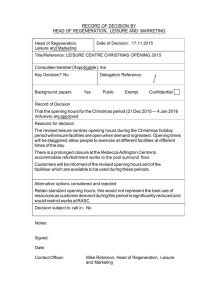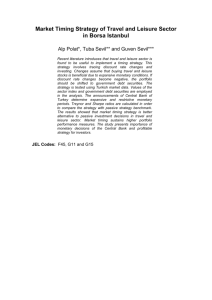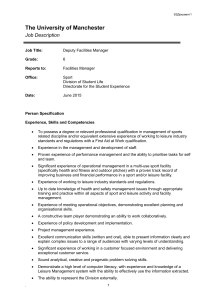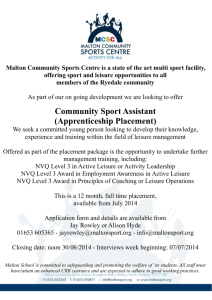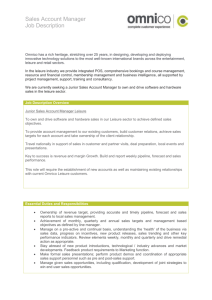DOWNLOADHNC Marine Leisure Management
advertisement
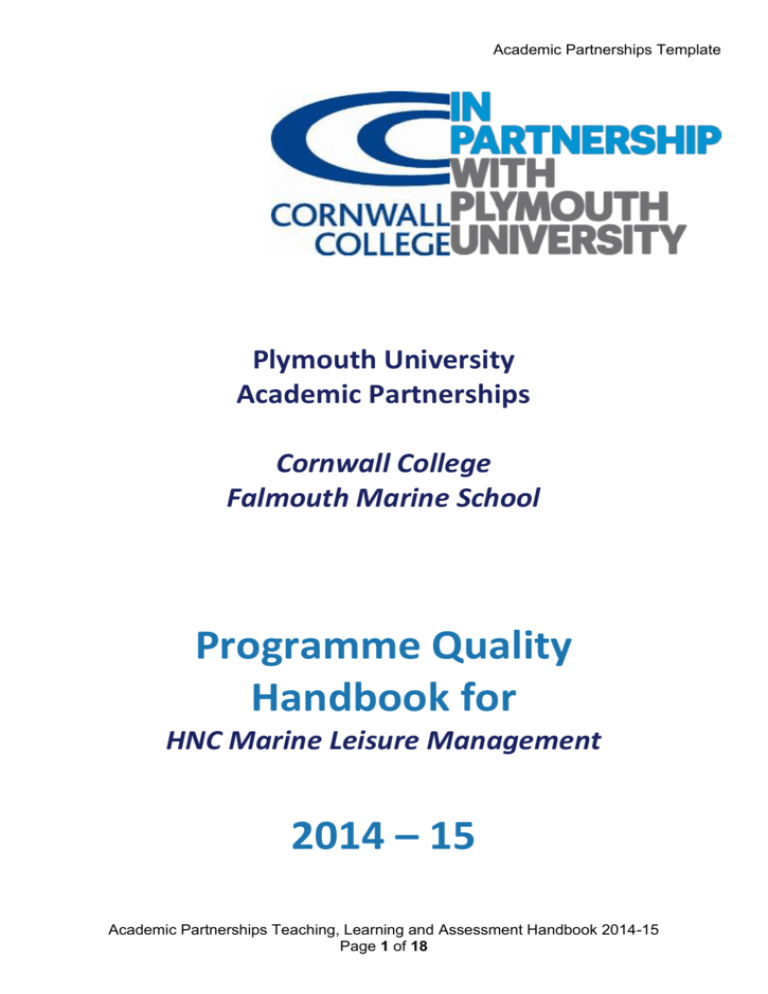
Academic Partnerships Template Plymouth University Academic Partnerships Cornwall College Falmouth Marine School Programme Quality Handbook for HNC Marine Leisure Management 2014 – 15 Academic Partnerships Teaching, Learning and Assessment Handbook 2014-15 Page 1 of 18 Academic Partnerships Template Contents 1. Welcome and Introduction to Marine Leisure Management.................................................................... 3 2. Programme Specification ........................................................................................................................... 4 3. Module Records ....................................................................................................................................... 12 Academic Partnerships Teaching, Learning and Assessment Handbook 2014-15 Page 2 of 18 1. Welcome and Introduction to Marine Leisure Management. Welcome to HNC Marine Leisure Management. The College is delighted that you have chosen to study with us. We are sure you are going to have a great time here and will get a great deal from the programme. This programme has been designed to equip you with the skills and knowledge base required to work in your chosen specialism or other graduate opportunities. It is also a platform from which you can undertake additional vocational and academic qualifications. This Programme Quality handbook contains important information including: The approved programme specification Module records Note: the information in this handbook should be read in conjunction with the current edition of the College / University Student handbook available at (college to add link) which contains student support based information on issues such as finance and studying at HE along with the University’s Student Handbook - https://www1.plymouth.ac.uk/studenthandbook and your Teaching, Learning and Assessment Handbook available on your programme virtual learning environment. Academic Partnerships Teaching, Learning and Assessment Handbook 2014-15 Page 3 of 18 Academic Partnerships Template 2. Programme Specification On the following pages you will find the specification for your programme; this provides a detailed overview of the programme as a whole. It explains what you will learn and how you will be assessed throughout the two stages of your HNC or HND. The Programme Learning Outcomes Map specifies the knowledge and skills you will develop at each stage of your HNC Awarding Institution: Plymouth University Teaching Institution: Cornwall College Accrediting Body: Not applicable Language of Study: English Mode of Study: Full time/Part time Final Award: HNC Intermediate Award: Not applicable Programme Title: HNC Marine Leisure Management UCAS Code: 2H7Y JACS Code: N800 Benchmarks: Informed by: General Business and Management (2007) Hospitality, leisure, sport and tourism (2008) 11 April 2014 Date of Programme Approval: Brief Description of the Programme The HNC Marine Leisure Management is intended to: Provide a challenging, innovative and broad based programme of study that will enable the candidate to develop the concepts, knowledge, skills and techniques required from the marine leisure management industry on a regional, national and global basis. Meet the needs of the marine leisure management industries, reflecting the need to add skills to current employees and provide skilled new employees that can respond to current industry needs as well as identifying and responding to future trends and interests. Utilise the outstanding locations that Falmouth and Cornwall have to offer and embed its use into the delivery of the course. Attract students who come from a wide variety of academic and employment backgrounds and are interested in developing their vocational skills required for progression in to the industry. Utilise the long history of regional, national and international staff experience to ensure the relevance of each lecture, seminar and practical session Ensure that each student develops relevant employment skills throughout the course. Academic Partnerships Teaching, Learning and Assessment Handbook 2014-15 Page 4 of 18 Academic Partnerships Template Programme Aims The programme will deliver: 1. A challenging, innovative and broad based programme of study that will enable the candidate to develop the concepts, knowledge, skills and techniques required by the marine leisure management industry which is a global business. 2. Graduates who will meet the needs of the marine leisure management and sports industries, reflecting the requirement to enhance the management skills of current employees and provide skilled new employees. 3. A high level of practical skills training and skills analysis that will also form part of the employability training. 4. A means of attracting students who come from a wide variety of academic and employment backgrounds and who are interested in developing the ability to integrate the theory and practice associated with the industry, enabling the understanding of the subject area through both academic and professional reflective practice. 5. A high degree of contextualised module delivery that utilises the regional, national and international experience of staff and will provide the platform for a successful career path. Programme Intended Learning Outcomes (ILO) By the end of this programme the students will be able to: 1. Demonstrate knowledge of the marine sport and leisure industry 2. Apply coaching and mentoring theories to practice. 3. Explain human resources and identify their importance in centre management 4. Demonstrate good customer care in the leisure service environment 5. Demonstrate the knowledge and skills required to understand the principles of and participate in practical water activity and management scenarios. 6. Demonstrate the qualities and skills required to progress in a career associated marine leisure management. Distinctive Features The distinctive features of the course are: • Located in Falmouth which is a thriving marine leisure town, the course will make full use of local business as prime case studies. The river Fal itself will serve as a base for a variety of water activities and a testing ground for developing skills. The local maritime leisure environment will act as a sound base for the content of the course. • Marine leisure is a constantly developing and evolving industry. The whole of the Cornish coastline offers many locations and a variety of conditions to aid in the learners’ development. • Delivery will be based at the new college campus in Falmouth. Comparatively small class numbers will provide an enhanced opportunity for students to benefit from the pastoral and tutorial support of the College staff. • The course is intended to attract students with marine industry backgrounds who would like to develop the skills to enable them to progress through managerial roles within the industry. There will be lots of contact and work with industry to help give students the best feel of this vocational industry. Academic Partnerships Teaching, Learning and Assessment Handbook 2014-15 Page 5 of 18 Academic Partnerships Template • Utilising the long history of international experience of its staff, the course will not only ensure that its students are familiar with the current trends and influences associated with the marine leisure industry and operational needs but it will prepare them to anticipate and capitalise upon any future global opportunities. In order to meet industry needs the programme will be delivered between October and April. This will allow students to be in a position to seek employment at the very start of the season. • Progression Route(s) The HNC Marine Leisure Management does not have a guaranteed progression route in place. However, it does provide students with the opportunity to progress onto further study at Level 5, due to the completion of 120 credits at Level 4. This qualification supports progression within a company to positions of a managerial nature. Similarly, it will provide students with the necessary skills to launch their own business venture. Admissions Criteria Qualification(s) Required for Entry to this Programme: Details: Level 2: - Key Skills requirement / Higher Level Diploma: Normally: Literacy, Numeracy and Science and/or - GCSEs required at Grade C or above: Maths and English Level 3: at least one of the following: - A Levels required to meet AS/A2/UCAS Points Tariff: . - Advanced Level Diploma: - BTEC National Certificate/Diploma: - HNC/D: - VDA: AGNVQ, AVCE, AVS: - Access to HE or Year 0 provision: - International Baccalaureate: - Irish / Scottish Highers / Advanced Highers: Work Experience: Other non-standard awards or experiences: APEL / APCL possibilities: Interviews DBS 120 points – sports/active leisure Sports, Outdoor adventure/leisure PPP at Extended Diploma Successful completion of an access programme Pass in all areas Normally 120 points to include Scottish Higher or Advanced Higher Watersports, outdoor sports and adventurous activity to include satisfactory references. To be reviewed during application process Applications are considered on an individual basis It is intended to interview all candidates for suitability for the programme. All students will be required to undertake DBS screening to allow delivery of NGB short courses to young people. Academic Partnerships Teaching, Learning and Assessment Handbook 2014-15 Page 6 of 18 Exposition and Mapping of Learning Outcomes, Teaching & Learning and Assessment Level: 4 Definitions of Graduate Attributes and Skills Relevant to this Programme Teaching and Learning Strategy / Methods Programme Aims Programme Intended Learning Outcomes Range of Assessments Related Core Modules Knowledge / Understanding: For this sub-bachelor level programme the following has been informed by the Foundation Degree Qualification Benchmark (FDQB), as well as QAA Subject Benchmark(s)” A HNC graduate in leisure will be able to employ a range of 'leisure specific' facilitation skills in the promotion of professional practice, by the end of this level of this programme the students will be able to: Critically evaluate the role and impact of global and local leisure structures and organisations. Write and critically evaluate leisure plans, development plans and recognise and meet the leisure needs of specific communities. Critically reflect upon the role of those organisations and structures charged with a responsibility for the promotion of leisure or the training of practitioners in leisure. Evaluate the impact and role of leisure events in everyday life Showing evidence of the skills required to monitor and evaluate sports performance in field settings 1, 2 Primary: Lectures and Tutorials Field trips and visits to local case studies Guest speakers Guided independent studies Practical time afloat 3,4 1,2 1,2,3,4 1,2,3 Examinations/reports Group and individual presentations CORF140 CORF142 2,3,4 Secondary/Supplementary: Critical evaluation of practical water sessions CORF141 1,2 Session feedback from exterior parties 1,2 2,3,4 2,3,4 Academic Partnerships Teaching, Learning and Assessment Handbook 2014-15 Page 7 of 18 Academic Partnerships Template An exposition for embedding Knowledge and Understanding through Teaching & Learning and Assessment at this level of the programme: The learner has demonstrated a given factual and/or conceptual knowledge base with emphasis on the nature of the industry and appropriate terminology and can demonstrate awareness skills associated with the subject. Cognitive and Intellectual Skills A HNC graduate in leisure will be able to understand, critically evaluate and reflect on issues of lifestyle, consumption and culture as they affect people's leisure lives. By the end of this level of this programme the students will be able to: Review and analyse the political and economic factors which affect the supply of, and demands for, leisure Critically reflect on the impact of leisure in the lives of individuals and analyse barriers to participation Primary: Lectures, Tutorials Guided study Guest speakers 1 3,4 1,3 Examinations/reports CORF140 Group and individual presentations CORF142 1,2,3 Secondary/Supplementary: Case studies Testimonies Guided study 2 3 CORF138 Evaluate the importance of cultural and other diversities in developing access to participation in leisure by specific target groups. An exposition for embedding Cognitive and Intellectual Skills through Teaching & Learning and Assessment at this level of the programme: The learner can work effectively with others as members of a group and meet obligations to others; they can work within an appropriate ethos and can access and use a range of learning resources; they can evaluate their own strengths and weaknesses within criteria largely set by others; they can manage information, collect appropriate data from a range of sources and undertake simple research tasks with external guidance; they can take responsibility for their own learning with appropriate support; they can communicate effectively and report practical procedures in a clear and concise manner; they can apply given tools / methods accurately and carefully to a well-defined problem and appreciate the complexity of the issues in the discipline. Key Transferable Skills: A HNC graduate in leisure will be able to understand, critically evaluate and reflect on issues of lifestyle, consumption and culture as they affect people's leisure lives. . Academic Partnerships Teaching, Learning and Assessment Handbook 2014-15 Page 8 of 18 Academic Partnerships Template By the end of this level of this programme the students will be able to demonstrate for: A threshold pass: Primary: 1,2 1,2 Report / Presentation / CORF138 Operate and effectively manage resources, Lectures, Case study including human (paid or volunteer), financial, Tutorials venue, and subcontracted and technical Guided study resources Guest speakers 1,2,3 1,2,3,4 Essay / Report / CORF141 Demonstrate the skills necessary both to Management of Practical deliver and reflect upon a leisure experience Secondary/Supplementary: Exercise aimed at a specific group, for example an Case studies event or a competition Testimonies 1,2 1,2,3,4 Coursework / Case Study CORF121 Appraising and evaluating the effects of sport Presentations and exercise intervention on the participant Guided study. Consistently demonstrate a command of subject-specific skills including application of knowledge, as well as proficiency in intellectual skills An exposition for embedding Key Transferable Skills through Teaching & Learning and Assessment at this level of the programme: The learner can work effectively with others as members of a group and meet obligations to others; they can work within an appropriate ethos and can access and use a range of learning resources; they can evaluate their own strengths and weaknesses within criteria largely set by others; they can manage information, collect appropriate data from a range of sources and undertake simple research tasks with external guidance; they can take responsibility for their own learning with appropriate support; they can communicate effectively and report practical procedures in a clear and concise manner; they can apply given tools / methods accurately and carefully to a well-defined problem and appreciate the complexity of the issues in the discipline. Employment Related Skills: A HNC graduate in leisure will be able to understand, critically evaluate and reflect on issues of lifestyle, consumption and culture as they affect people's leisure lives. By the end of this level of this programme the students will be able to demonstrate for: A threshold pass: Demonstrate the skills necessary both to deliver and reflect upon a leisure experience aimed at a specific group, for example an event or a competition. Analyse and reflect upon the environment in Primary: Lectures, Tutorials Guided study Guest speakers 1,2,3 2,3,4 Coursework / Case Study Presentations CORF121 2 2,4 Examinations/reports CORF140 Academic Partnerships Teaching, Learning and Assessment Handbook 2014-15 Page 9 of 18 Academic Partnerships Template which leisure operations take place Secondary/Supplementary: 2,3 1,2,3,4 Essay / Report / CORF141 Displaying a broad range of skills, including Case studies Management of Practical awareness of health and safety, ethical Testimony’s Exercise considerations, exercise prescription, population differences and the role of Guided study. education, health and sports bodies in improving the health of the nation. An exposition for embedding Employment Related Skills through Teaching & Learning and Assessment at this level of the programme: The learner has demonstrated an understanding of organisational and work based practices; they have put theory in to practice by applying and developing discipline related skills, knowledge and understanding for example they will be placed in situations similar to those of the workplace enabling them to be assessed against criteria laid down by a National Awarding Bodies (NGBs) which sets the industries working standards Practical Skills: A HNC graduate in leisure will be able to understand, critically evaluate and reflect on issues of lifestyle, consumption and culture as they affect people's leisure lives. By the end of this level of this programme the students will be able to demonstrate for: A threshold pass: Analyse the quality of the service encounter and its impact on the hospitality consumer and the service provider. Showing evidence of the skills required to monitor and evaluate human responses to sport and/or exercise Demonstrate the skills necessary both to deliver and reflect upon a leisure experience aimed at a specific group, for example an event or a competition Primary: Practical coaching sessions afloat, Peer feedback scenarios Lectures, Tutorials Guided study Guest speakers 1,2 1,2,3,4 CORF139 1,2, 2,3,4, CORF141 1,2 1,2,3,4 CORF138 CORF141 Secondary/Supplementary: Case studies Guided study An exposition for embedding Practical Skills through Teaching & Learning and Assessment at this level of the programme: Learners will have demonstrated an ability to apply practical skills developed within the course to a wide variety of industry related scenarios and will be required to complete a range of practical based skills assessments throughout this unit. Practical skills will be embedded into the programme forming an essential part of the learners CPD, this will enable to gain high level coaching qualifications associated with the roles of centre managers. Academic Partnerships Teaching, Learning and Assessment Handbook 2014-15 Page 10 of 18 Programme Structure Diagram College: Cornwall College 2707 Year: 2014/15 PU Course Code: Programme: HNC Marine Leisure Management Mode of Attendance: Full Time Total Credits: 120 Stage 1 Module Code CORC1013C CORF121 CORF138 CORF139 CORF140 CORF141 CORF142 Module Title Personal and Employability Skills Development Business, Media and Events Managing Human Resources Customer Service Managing and Operating a Sports and Leisure Facility Coaching Skills and Theories The Marine Sport and Leisure Industry No. of Credits 20 20 10 10 20 20 20 Core / Optional Core Core Core Core Core Core Core No. of Credits 20 10 10 20 Core / Optional Core Core Core Core No. of Credits 20 20 20 Core / Optional Core Core Core College: Cornwall College 2707 Year: 2014/15 PU Course Code: Programme: HNC Marine Leisure Management Mode of Attendance: Part Time Total Credits: 120 Year 1 Module Code CORC1013C CORF138 CORF139 CORF142 Module Title Personal and Employability Skills Development Managing Human Resources Customer Service The Marine Sport and Leisure Industry Year 2 Module Code CORF121 CORF140 CORF141 Module Title Business, Media and Events Managing and Operating a Sports and Leisure Facility Coaching Skills and Theories Academic Partnerships Teaching, Learning and Assessment Handbook 2014-15 Page 11 of 18 Academic Partnerships Template 3. Module Records Academic Partnerships Teaching, Learning and Assessment Handbook 2014-15 Page 12 of 18 Academic Partnerships Template Academic Partnerships Teaching, Learning and Assessment Handbook 2014-15 Page 13 of 18 Academic Partnerships Template Academic Partnerships Teaching, Learning and Assessment Handbook 2014-15 Page 14 of 18 Academic Partnerships Template Academic Partnerships Teaching, Learning and Assessment Handbook 2014-15 Page 15 of 18 Academic Partnerships Template Academic Partnerships Teaching, Learning and Assessment Handbook 2014-15 Page 16 of 18 Academic Partnerships Template Academic Partnerships Teaching, Learning and Assessment Handbook 2014-15 Page 17 of 18 Academic Partnerships Template Academic Partnerships Teaching, Learning and Assessment Handbook 2014-15 Page 18 of 18


